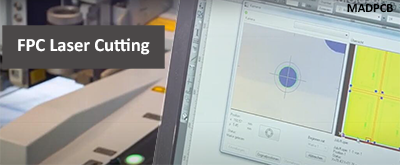Table of Contents
Flex- and Rigid-Flex PCB Profiling: Laser Cut
In past, individual PCB depaneling from a production panel, has faced an onslaught of challenges given the rise of flexible PCB materials. Mechanical profiling techniques such as V-scoring and routing can easily damage sensitive and thin substrates, creating problems for PCB manufacturers who profile flex and rigid-flex boards. As a reliable flex and flex-rigid PCB manufacturer in China, MADPCB adopts laser cut technique for many years. Laser cutting can eliminate the effects of mechanical stress that occur during profiling such as burring, deformation, and damage to flexible circuit.
Laser Cut Flexible Materials
In the production of flex PCB and rigid-flex PCB, especially for prototypes and small batch, laser cutting will save your cost and reduces the turnarounds. In low quantity FPC fabrication, laser cut is mainly used for cutting flexible materials, including
- FCCL: Polyimide (PI, also known as Kapton) and Polyester (PET) based flexible copper clad laminate (FCCL).
- Adhesive: used for bonding multi-layer FCCL, PI stiffener and top side of coverlay.
- Coverlay: used for covering flexible copper layers.
- PI stiffeners: mechanical support or heat dissipation element.
- EMI shielding film
- 3M/Tesa PSA (Pressure Sensitive Adhesive)
In the fabrication of Dual-Access Flex Circuits, laser cutting or laser drilling plays an role of depth-controlled drilling, which is also called Laser Depth Control. The laser beam only ablate the flexible dielectric materials and will not damage copper.
Benefits of Laser Cut
- Profiling precision in the micron range.
- No material fixation necessary due to vacuum table.
- No flaking of material such as the case with die punching due to contact-free and force-free processing.
- No knife cleaning.
- No tool wear and thus, a constantly high cutting quality.
- High flexibility in contour -without tool preparation or tool changes.
When Choose Laser Cut?
At MADPCB, we always consider the competitive pricing for our customer when manufacture flexible circuits. Laser cutting is ideal for close tolerance before investing in expensive punching dies. For example, small form-fit devices or ZIF connectors. Laser cut profiling provides a great way to generate pattern routed b-stage adhesive. The laser process can form a “cured” edge along the rout path of the adhesive to reduce the amount of resin squeeze-out that is released by the press lamination process.
Laser Cut Data Requirements
In laser cut processing, although most file types are acceptable, the preferred file types are Gerber, Excellon, DXF, or other 2D formats. In most cases, non-scaled data is required as MADPCB will make the appropriate scaling or offsets to meet production panel sizes.

